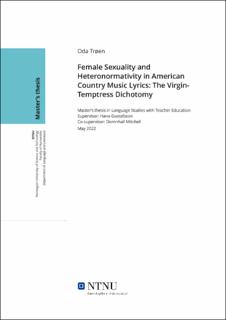| dc.contributor.advisor | Gustafsson, Hana. | |
| dc.contributor.advisor | Mitchell, Domnhall. | |
| dc.contributor.author | Trøen, Oda. | |
| dc.date.accessioned | 2022-07-12T17:19:57Z | |
| dc.date.available | 2022-07-12T17:19:57Z | |
| dc.date.issued | 2022 | |
| dc.identifier | no.ntnu:inspera:109722273:24772611 | |
| dc.identifier.uri | https://hdl.handle.net/11250/3004820 | |
| dc.description.abstract | Kvinnelig seksualitet i vestlige samfunn har tradisjonelt blitt påvirket av heteronormative konsepter som jomfru-fristerinne-dikotomien. Denne dikotomien er et kulturelt konstrukt som framsetter jomfru-rollen som et ideal og fristerinnen som et moralsk lavpunkt. Dikotomien er i tillegg en faktor som påvirker måten kvinner ser på seg selv i møte med intime relasjoner. I denne teksten har jeg undersøkt i hvor stor grad visse amerikanske country-tekster, skrevet og utgitt av kvinner, stiller spørsmål ved eller forsterker jomfru-fristerinne-dikotomien. Dette har blitt utført gjennom en metode der jeg bruker Systemic Functional Linguistics (SFL) og Feminist Critical Discourse Analysis (FCDA). Teksten inneholder en analyse av de fire kommersielt suksessrike låtene “Just Because I’m a Woman” av Dolly Parton (1968), “Wings Upon Your Horn” av Loretta Lynn (1970), “RSVP” av Maren Morris (2019) og “One Night Standards” av Ashley McBryde (2019). Resultatene viser at hver sang utfordrer visse aspekter ved både jomfru-karakteren og fristerinne-karakteren – men alle tekstene inneholder referanser til den tradisjonelle dikotomien for å oppnå dette. Derfor argumenterer jeg for at country-tekstene i analysen forsterker konvensjonen om jomfru-fristerinne-dikotomien. | |
| dc.description.abstract | Expressions of female sexuality have been strongly affected by heteronormative beliefs in Western societies, and among these one of the most influential is the virgin-temptress dichotomy. This is a cultural construct that portrays the virgin as an ideal role model for all women and the temptress as a role to be avoided. The dichotomy is furthermore a factor that influences the way women view themselves in the pursuit of and fulfilment of sexual needs. In this paper, I have investigated to what extent some American country music lyrics – written and performed by women - perpetuate or challenge the heteronormative concepts of the virgin-temptress dichotomy. This is performed though a combination of the frameworks Systemic Functional Linguistics (SFL) and Feminist Critical Discourse Analysis (FCDA) to the four commercially successful country songs “Just Because I’m a Woman” by Dolly Parton (1968), “Wings Upon Your Horn” by Loretta Lynn (1970), “RSVP” by Maren Morris (2019), and “One Night Standards” by Ashley McBryde (2019). The results suggest that each song challenges certain aspects of the virgin and the temptress stereotypes, but all the songs still refer to the traditional dichotomy when doing so. I argue that the need to use these characters as reference points, functions to reinforce the dichotomy. | |
| dc.language | eng | |
| dc.publisher | NTNU | |
| dc.title | Female Sexuality and Heteronormativity in American Country Music Lyrics: The Virgin-Temptress Dichotomy | |
| dc.type | Master thesis | |
